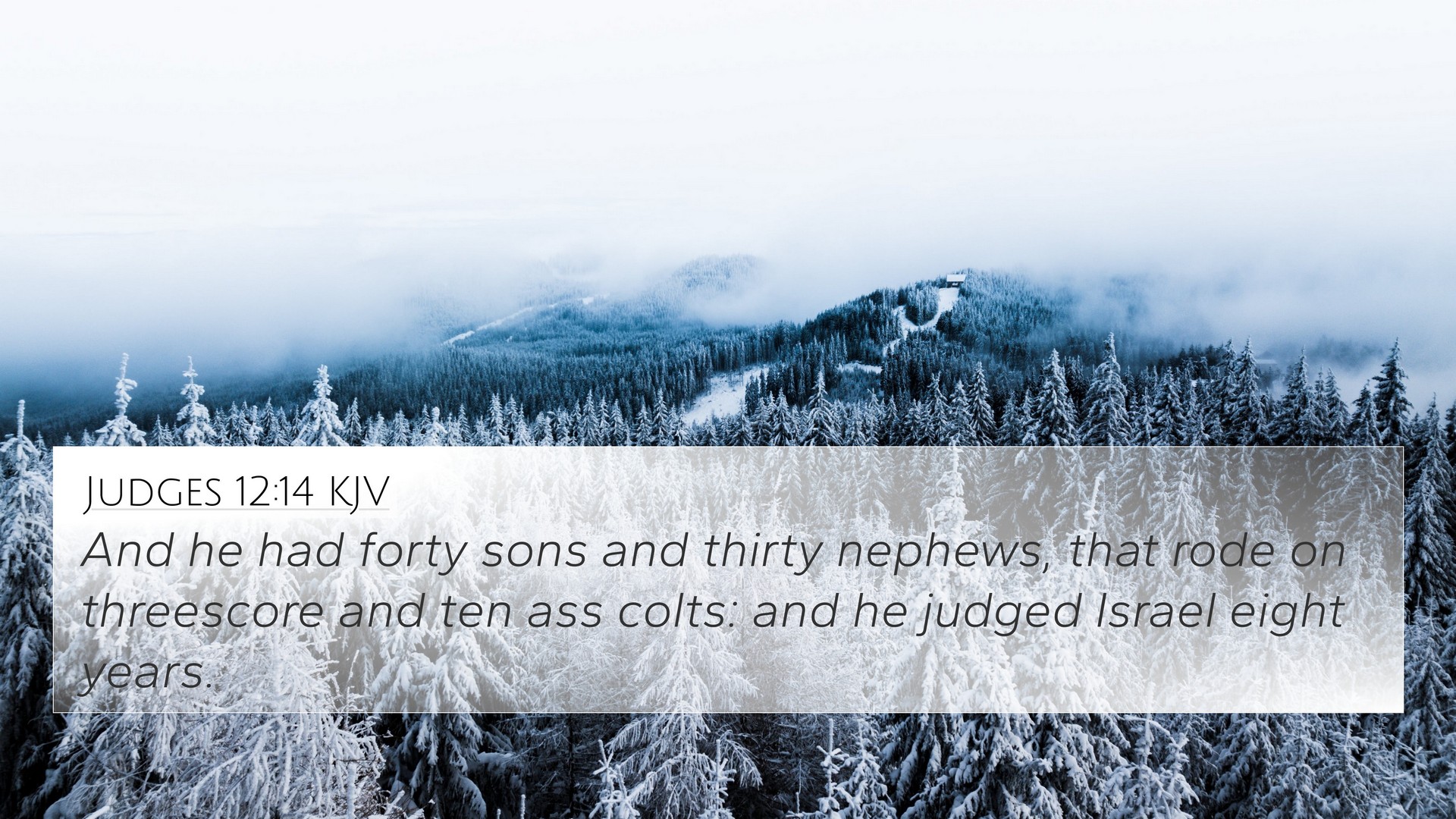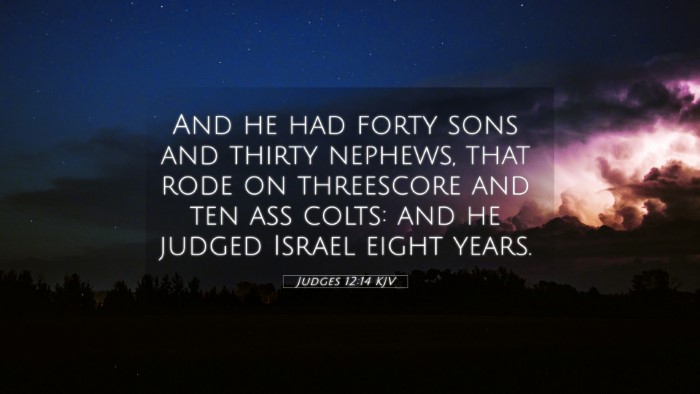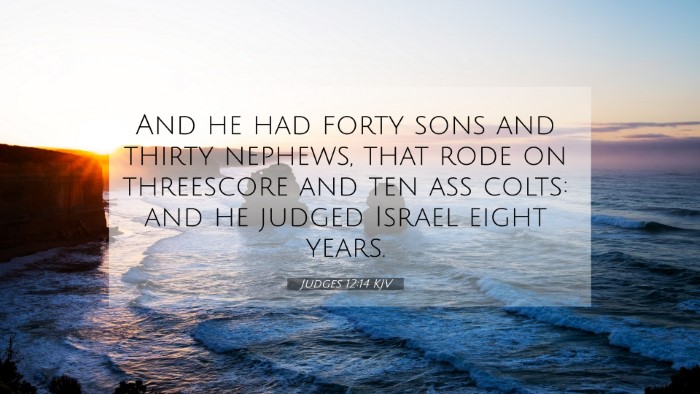Old Testament
Genesis Exodus Leviticus Numbers Deuteronomy Joshua Judges Ruth 1 Samuel 2 Samuel 1 Kings 2 Kings 1 Chronicles 2 Chronicles Ezra Nehemiah Esther Job Psalms Proverbs Ecclesiastes Song of Solomon Isaiah Jeremiah Lamentations Ezekiel Daniel Hosea Joel Amos Obadiah Jonah Micah Nahum Habakkuk Zephaniah Haggai Zechariah MalachiJudges 12:14 Similar Verses
Judges 12:14 Cross References
And he had forty sons and thirty nephews, that rode on threescore and ten ass colts: and he judged Israel eight years.
Uncover the Rich Themes and Topics of This Bible Verse
Listed below are the Bible themes associated with Judges 12:14. We invite you to explore each theme to gain deeper insights into the Scriptures.
Judges 12:14 Cross Reference Verses
This section features a detailed cross-reference designed to enrich your understanding of the Scriptures. Below, you will find carefully selected verses that echo the themes and teachings related to Judges 12:14 KJV. Click on any image to explore detailed analyses of related Bible verses and uncover deeper theological insights.
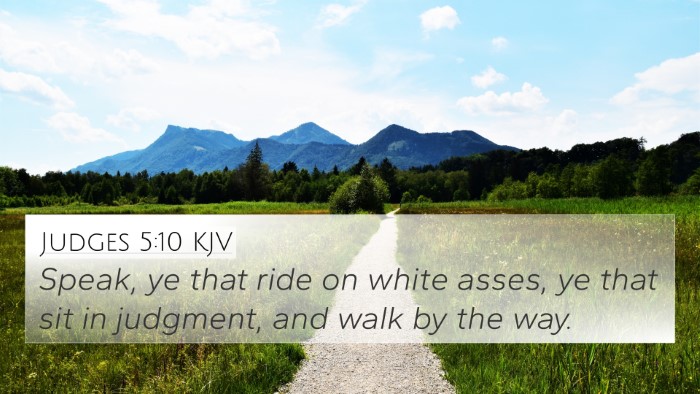
Judges 5:10 (KJV) »
Speak, ye that ride on white asses, ye that sit in judgment, and walk by the way.
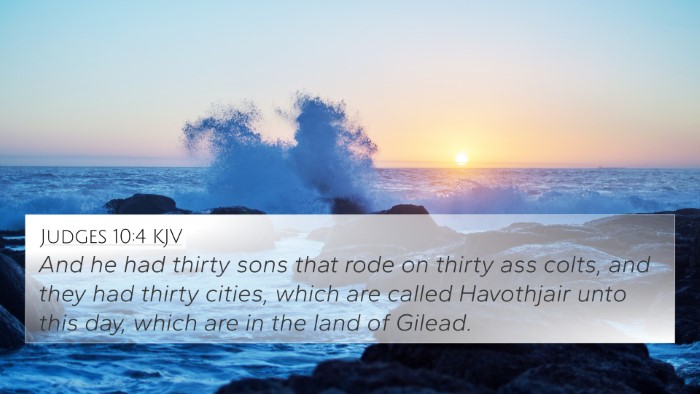
Judges 10:4 (KJV) »
And he had thirty sons that rode on thirty ass colts, and they had thirty cities, which are called Havothjair unto this day, which are in the land of Gilead.
Judges 12:14 Verse Analysis and Similar Verses
Understanding Judges 12:14
Judges 12:14 states, "And he had forty sons and thirty grandsons, who rode on seventy young donkeys. He judged Israel eight years." This verse, while brief, reveals aspects of leadership, familial legacy, and the criteria for judgment within Israel during this period. Below, we explore the meanings and implications of this verse through a synthesis of public domain commentaries, highlighting its connections with other Bible verses.
Summary of Judges 12:14
The verse discusses the judge Jephthah's family, particularly the number of sons and grandsons he had, emphasizing their status and roles in society. Notably, the use of donkeys indicates a certain level of privilege and importance, as these animals were often associated with wealth and authority.
Insights from Commentaries
Matthew Henry
Matthew Henry notes the significance of Jephthah's progeny, indicating that having a large family was both a blessing and a reflection of a leader's strength. The inclusion of his sons and grandsons riding on young donkeys signifies their esteem in society. Furthermore, Henry emphasizes that Jephthah's legacy continues through his offspring, underscoring the importance of familial lines in biblical history.
Albert Barnes
Albert Barnes interprets the 40 sons and 30 grandsons as representing both the familial and judicial authority of Jephthah. He suggests that this multitude positioned him as a notable and respected leader in Israel. Barnes highlights that the number of descendants is a reflection not just of personal fortune but also of God’s favor, as during this time, great leaders were often blessed with numerous heirs.
Adam Clarke
Adam Clarke provides insight into the societal norms of ancient Israel and suggests that Jephthah’s large family came with responsibilities. His observations of the mode of transport—young donkeys—are significant as they represented both nobility and functionality. Clarke links Jephthah’s reign to the overall governance structures in Israel, implying that his eight years of judgment were marked by a strong familial backing.
Cross-References and Connections
Judges 12:14 can be contextualized and better understood through various connected scripture references. Here are some notable cross-references:
- Judges 11:1-6 - The story of Jephthah's rise to leadership.
- 1 Samuel 8:20 - The desire for a king, contrasting the rule of judges.
- 2 Samuel 15:1 - The use of donkeys by Absalom indicates royal status.
- Psalm 127:3-5 - The blessing of children as a heritage from the Lord.
- Proverbs 17:6 - The importance of descendants and their honor.
- 1 Chronicles 5:18 - Mentioning the might of families in Israel, showing how legacy mattered.
- Isaiah 20:2 - The symbolism of donkeys and how they relate to prophets and leaders.
- Matthew 21:5 - Jesus riding on a donkey, symbolizing humility and kingship.
- Luke 10:3 - Instructions to the disciples about positioning themselves in society.
Thematically Related Scriptures
By exploring connections between these verses, one can identify themes such as leadership, legacy, importance of God’s favor, and societal roles. Cross-referencing provides further understanding of how these traits manifest throughout biblical history.
Tools for Cross-Referencing
Effective Bible study benefits from various tools and methods. Here are a few resources to enhance your understanding of cross-referencing:
- Bible concordance
- Bible cross-reference guide
- Online cross-reference systems
- Study Bibles with built-in references
- Bible chain references
- Comprehensive Bible cross-reference materials
Conclusion
Judges 12:14 serves as a reminder of the significance of leadership, family, and societal structure during the time of the judges in Israel. Through various commentaries and cross-references, one can gain deeper insights into the character of Jephthah and the values of the society in which he lived. This example also underscores the relevance of effective cross-referencing in Bible study for a richer understanding of scriptural themes.
